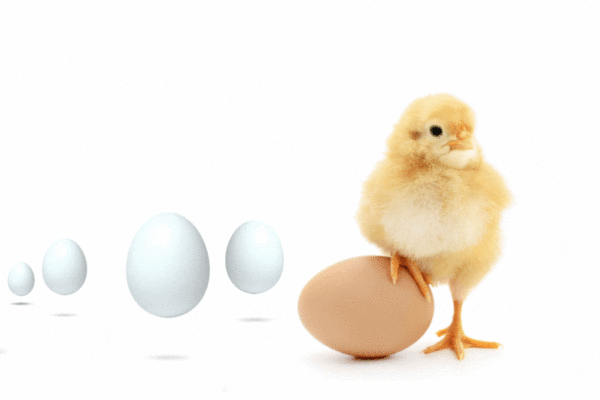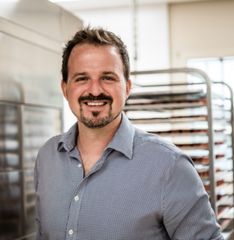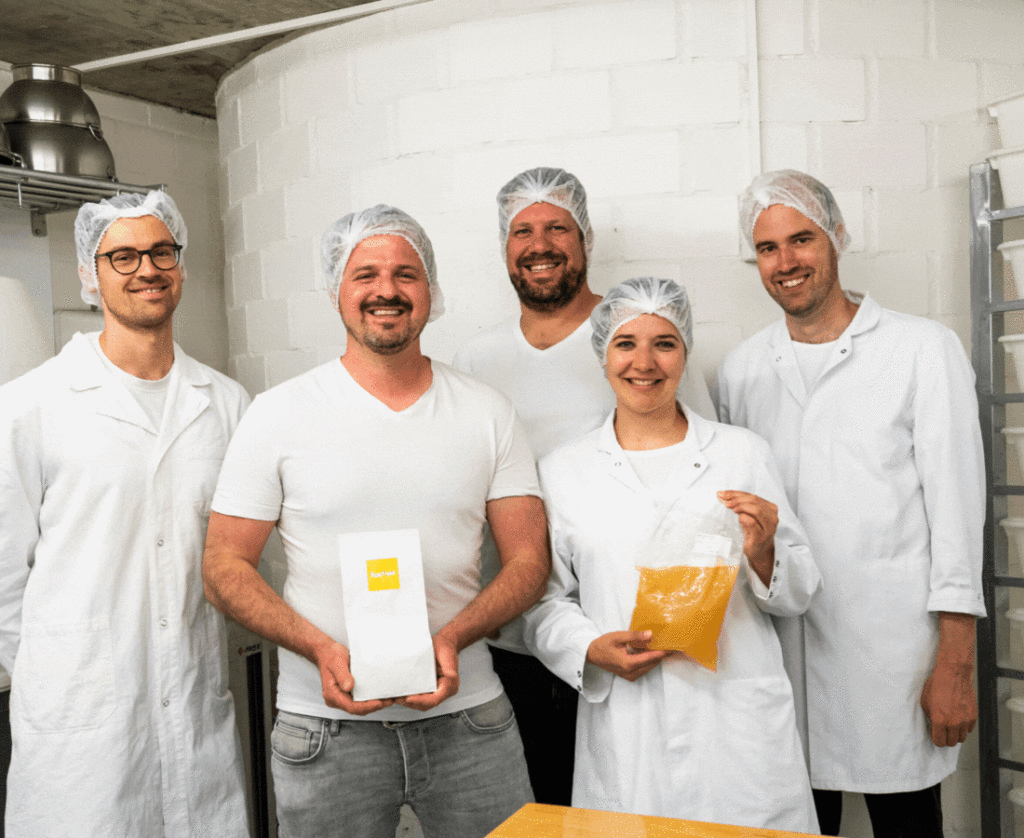
#foodtech: egg substitute for the food industry
Our former HSLU and Applied Data Science student Silvan Leibacher is the founder of EggField & Leibacher Biber-Manufaktur. #FoodTech is a topic which has accompanied Silvan for years. He is working on new approaches in the food production value chain, which are urgently needed nowadays. One of his worldchanging projects we would like to highlight is the "egg substitute for the food industry". He manages to combine tradition with innovation and fearlessly bold is his guiding principle: "simply do it".
Shortcuts: Interview – Info-Events – Programme Information – Contact – Professional Data Science Portraits

Silvan Leibacher
Co-founder of EggField & Leibacher Biber-Manufaktur
#simplydoit #foodtech #leibacherbiber #eggfield
First of all, tell us something about yourself: Which hashtags describe you the best?
I would choose #simplydoit, #foodtech, and #leibacherbiber as hashtags, and of course #eggfield.
Tell us more about them.
For me, the idea of “just doing it” is a declaration of love for trying things out and tackling possibilities instead of over-thinking things. It means coming to terms with imperfections and failure on a small scale and courageously daring to do things, taking risks and launching new projects. Of course, I don’t always succeed – but I like this approach a lot in principle.
#foodtech is a topic I’ve been thinking about for years. I’m fascinated by new approaches in the value chain of food production and believe they are urgently needed. It takes a lot of resources to produce food for eight billion people. And the production of animal-based foods alone emits more CO2 than the use of all cars, planes and ships worldwide combined. Technology and creativity are very much in demand when it comes to rethinking our food systems.
#LeibacherBiber and #EggField are the two projects that take up the most time at the moment and allow me to be my entrepreneurial self.
Let’s talk about your professional life: What do you do at Leibacher Biber-Manufaktur and EggField?
I am a co-founder of both companies, although the idea for EggField came from Leibacher Biber-Manufaktur while I was studying at HSLU.
At Leibacher Biber-Manufaktur, I have been developing strategy, finance and marketing concepts over the last twelve years. Last year, I handed over the marketing department to my sister so that I can dedicate more time to EggField, my second company. When we founded EggField in the spring of 2022, I assumed the role of CEO.
What did you do before that?
After my commercial apprenticeship in the media business, I studied business administration before switching to Unilever. From there, I moved on to an online marketplace to learn about how the world of food and consumer goods works.
Let’s turn to your project: Please tell us about it.
Leibacher Biber-Manufaktur is all about showing how you can create delicious baked goods by combining tradition with innovation. My siblings and I founded the company in 2010. Biber is a filled gingerbread and a traditional Swiss speciality. In recent years, we launched the Biber product with all our innovations in plant-based versions and by relying on established as well as innovative production methods. We set ourselves the goal of creating unusual products of a high quality made as sustainably as possible from regional raw materials. This is what our LEIBACHER brand stands for today.
The search for innovative ingredients has also led us to come up with the concepts for EggField. It took us a long time to find a plant-based alternative for eggs that is sustainable and suitable for our recipes. While looking for a solution to this problem, I met David Ebneter, who was working as a food technologist at a university at the time and had a lot of experience with plant extracts. Together we developed a plant-based egg substitute that worked well and could meet our needs and requirements. When we realized that many other bakeries also had trouble finding a good egg substitute, we further developed our product – with Melanie Binggeli, an agronomist and Pioneer Fellow at ETH at the time, as well as with the Bern University of Applied Sciences and Swiss Food Research – brought it to market, and gave it the name EggField.
Today we already have seven employees, including David Ebneter, Riet Steiger and myself as co-founders. This summer we were able to wind up an initial round of financing.
What data do you use, what methods do you apply and what insights have you gained or hope to gain?
Data is very important when it comes to developing and producing food, especially egg substitutes. Besides taking and evaluating samples for how long a product keeps, we want to make sure it remains functional if the quality of the raw materials should change. At the same time, we are working hard to further develop our products. There is little research so far on how plant proteins behave, something where I see a lot of potential – also with the use of new data processing methods. For example, this means testing a wide range of raw material combinations and then optimizing existing products and developing new ones.
How do you think your findings can help society?

Using plant-based rather than animal-based ingredients in food production makes a lot of sense from an ecological and ethical point of view in almost every case. Processed items such as pasta, cakes and sauces are not consumed because they contain animal components but because we as consumers like their taste. In the case of eggs, half of all eggs are turned into other products, and often these eggs come from an unsustainable and animal-unfriendly operation.
When we use substitutes in these products, we save large amounts of CO2 and at the same time reduce ethical concerns and lower the health risks associated with mass animal farming. In terms of taste, you don’t notice any difference – as a rule.
How are you looking to develop your project further?
We are working on scaling up production and bringing the product to the Swiss catering industry. So far we have already produced over 4,000 kg of egg substitutes. Our aim is to replace a large share of all the processed eggs with better, more sustainable ingredients.
We need to learn more about plant proteins to understand how they can help us feed more people more sustainably and thus preserve our ecosystems.
How did your studies (MSc in Applied Information and Data Science) influence the project?
We launched EggField while I was still at HSLU. Contrary to the questions surrounding Leibacher Biber-Manufaktur, EggField was always a tech-driven project. Eggs have many uses during the various application steps: whether you’re making meringue, quiche or mayonnaise, eggs have many functions that can be measured, evaluated and mapped. Before we started with the idea, David tested countless types of pulses and evaluated their suitability as a basis for an egg substitute. For some of these tests, our HSLU lecturer Matteo Tanadini helped us with evaluating the data, something that was very helpful for us in assessing the initial results.
After pursuing the project for the first few months while I was in the MA program on data science at HSLU, EggField took up more and more of my time as our customers started to become interested in our work. That’s why it became clear to me in the course of the year that, as much as I had enjoyed my time in Lucerne, I had to put my studies on hold after three semesters. So, I’m content – at least for now – with a having “half” an MA at this point.
The semesters at HSLU have shown me how data can help me deal with the challenges and questions I’m facing and how a data-driven approach can help me solve problems. Especially in the food-tech sector, there are many applications and lots of potential in collecting and evaluating data in a structured manner.
What advice would you give others who are starting a project?
There’s always a lot that you can’t plan. That’s why it’s worth trying things out and not just spinning ideas in your head. It takes stamina and courage, and always a fair amount of luck.
And finally: What new hashtag are you aiming for in 2023?
Moving forward doesn’t always depend on making huge leaps. Rather, it’s often a matter of taking small steps in the right direction that will help your project to move forward and hopefully take off. So, I’ll go for #alsosmallstepscanleadtothegoal.
We want to thank Silvan Leibacher for sharing this super interesting project portrait with us!
Author: Silvan Leibacher
Start your career with the MSc in Applied Information and Data Science now!
Register and join us for a free online Info-Event:
Monday, 9 March 2026 (Online, English)
Monday, 13 April 2026 (Online, German)
Monday, 11 May 2026 (Online, English)
Monday, 8 June 2026 (Online, German)
Programme Info: MSc in Applied Information and Data Science
More Field Reports & Experiences: Professional portraits & study insights
Frequently Asked Questions: FAQ


